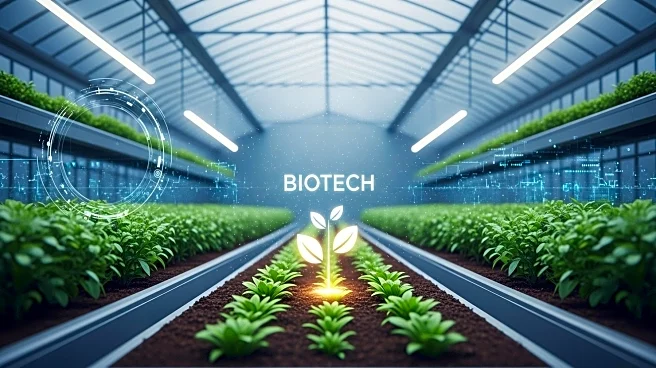What's Happening?
The United States agriculture biotech market is anticipated to grow significantly, reaching $213.3 billion by 2031, according to a report by DataM Intelligence. This growth is driven by the increasing adoption of biotechnological solutions aimed at enhancing crop yield, quality, and resilience. Recent developments include Bayer CropScience's launch of a gene-edited corn variety in Iowa and Corteva Agriscience's $60 million investment in Nebraska for climate-resilient crops. The market is bolstered by advancements in gene editing tools like CRISPR and RNA interference, which improve traits such as pest resistance and stress tolerance. The integration of biotechnology with digital tools and automated farming systems is enhancing efficiency and decision-making in agriculture.
Why It's Important?
The expansion of the agriculture biotech market is crucial for addressing food security and sustainable farming practices amid a growing global population. The adoption of genetically modified organisms, biofertilizers, and biopesticides is increasing, driven by the need for climate-resilient crops. This growth supports the U.S. agriculture sector's ability to meet rising food demands while reducing environmental impact. The market's expansion also reflects broader trends in precision agriculture and government initiatives supporting biotech adoption, which are essential for maintaining competitiveness in the global agricultural landscape.
What's Next?
The agriculture biotech market is expected to continue its growth trajectory, with ongoing investments in research and development. Companies like Monsanto and Syngenta are preparing for nationwide deployment of new biotech crops, which will further enhance yield and resilience. The focus on sustainable agriculture practices and reduced chemical inputs is likely to drive further adoption of biotechnological solutions. As the market evolves, stakeholders will need to navigate regulatory challenges and consumer acceptance of biotech products.
Beyond the Headlines
The rise of agriculture biotechnology presents ethical and cultural considerations, particularly regarding the use of genetically modified organisms. As biotech solutions become more prevalent, discussions around food safety, environmental impact, and consumer rights will intensify. Long-term shifts in farming practices may also influence rural economies and labor markets, as automation and precision agriculture technologies become more integrated into traditional farming methods.









